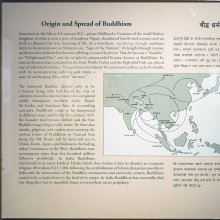Prathama, Prathamā: 23 definitions
Introduction:
Prathama means something in Buddhism, Pali, Hinduism, Sanskrit, Jainism, Prakrit, the history of ancient India, Marathi, Hindi. If you want to know the exact meaning, history, etymology or English translation of this term then check out the descriptions on this page. Add your comment or reference to a book if you want to contribute to this summary article.
Alternative spellings of this word include Pratham.
Images (photo gallery)
In Hinduism
Shaivism (Shaiva philosophy)
Source: Wisdom Library: Kubjikāmata-tantraPrathamā (प्रथमा):—Sanskrit name of one of the thirty-two female deities of the Somamaṇḍala (second maṇḍala of the Khecarīcakra) according to the kubjikāmata-tantra. These goddesses are situated on a ring of sixteen petals and represent the thirty-two syllables of the Aghoramantra. Each deity (including Prathamā) is small, plump and large-bellied. They can assume any form at will, have sixteen arms each, and are all mounted on a different animal.

Shaiva (शैव, śaiva) or Shaivism (śaivism) represents a tradition of Hinduism worshiping Shiva as the supreme being. Closely related to Shaktism, Shaiva literature includes a range of scriptures, including Tantras, while the root of this tradition may be traced back to the ancient Vedas.
Purana and Itihasa (epic history)
Source: Cologne Digital Sanskrit Dictionaries: The Purana IndexPrathama (प्रथम).—An Asura residing in Sutalam.*
- * Brahmāṇḍa-purāṇa II. 20. 21; Vāyu-purāṇa 50. 20.

The Purana (पुराण, purāṇas) refers to Sanskrit literature preserving ancient India’s vast cultural history, including historical legends, religious ceremonies, various arts and sciences. The eighteen mahapuranas total over 400,000 shlokas (metrical couplets) and date to at least several centuries BCE.
Shiksha (linguistics: phonetics, phonology etc.)
Source: Wisdomlib Libary: ŚikṣāPrathama (प्रथम, “the first”) is the name of a note (svara) used by singers of the sāmas (religious songs from Sāmaveda), corresponding to the madhyama-svara of the flute, according to the Nāradīyā-śīkṣā 1.5.1. The Nāradīyā-śīkṣā is an ancient Sanskrit treatise dealing phonetics and musicology. Its proclaimed author is the Nārada.
Shiksha (शिक्षा, śikṣā) deals with Sanskrit linguistics and represents a branch of vedanga (vedic ancillary science). Shiksha deals with subjects such as phonetics, phonology, study of sound, letters of the Sanskrit alphabet and related topics. Much attention is also given to the study of recitation (patha) of Vedic verses.
Vyakarana (Sanskrit grammar)
Source: Wikisource: A dictionary of Sanskrit grammarPrathama (प्रथम).—Lit, premier, first; the word is used in connection with the personal affixes तिप्, तस्, झि (tip, tas, jhi) (अन्ति (anti)) of verbal forms. See the word पुरुष (puruṣa) above; cf. अस्तिर्भवन्तीपरः प्रथमपुरुषः अप्रयु-ज्यमानोप्यस्तीति । वृक्षः प्लक्षः। (astirbhavantīparaḥ prathamapuruṣaḥ aprayu-jyamānopyastīti | vṛkṣaḥ plakṣaḥ|) M. Bh. on P. II. 3.1 and 4. The word प्रथम (prathama) is used in the Pratisakhya works in the sense of the first consonants of the five vargas or groups of consonants; cf. प्रथमैर्द्विती-यास्तृतीयैश्चतुर्थाः (prathamairdvitī-yāstṛtīyaiścaturthāḥ) V. Pr. IV. 110 cf. प्रथमतृतीयादीनामादेशादित्वादेत्वाभावः (prathamatṛtīyādīnāmādeśāditvādetvābhāvaḥ), M.Bh. on P. VI. 4.120 Vart 3, also cf. Katantra I. 4.1 and Hem. I. 3.35. The word is also used (in the feminine gender) in the sense of the case affixes सु (su) (स् (s)), औ, जस् (au, jas) (अस् (as)) of the nominative case. The word is also used in the sense of the premier accent उदात्त (udātta) (acute); cf. प्रथमभाविनः उदात्तभाविनः (prathamabhāvinaḥ udāttabhāvinaḥ) Uvvata on R. Pr. III. 8.
--- OR ---
Prathamā (प्रथमा).—The nominative case; case affixes of the nominative case. cf. प्रातिपदिकार्थलिङ्गपरिमाणवचनमात्रे प्रथमा (prātipadikārthaliṅgaparimāṇavacanamātre prathamā) P.II. 3.46.

Vyakarana (व्याकरण, vyākaraṇa) refers to Sanskrit grammar and represents one of the six additional sciences (vedanga) to be studied along with the Vedas. Vyakarana concerns itself with the rules of Sanskrit grammar and linguistic analysis in order to establish the correct context of words and sentences.
Vaishnavism (Vaishava dharma)
Source: Pure Bhakti: Arcana-dipika - 3rd EditionPrathama (प्रथम) or Pratipat refers to one of the various “lunar days” (tithi):—There are approximately 29.5 lunar days in a lunar month. The first fifteen days begin with the first phase of the waxing moon (pratipat) and end with the full moon (pūrṇimā). [...] In accordance with the lunar day, one would utter, [for example, pratipat-tithau].

Vaishnava (वैष्णव, vaiṣṇava) or vaishnavism (vaiṣṇavism) represents a tradition of Hinduism worshipping Vishnu as the supreme Lord. Similar to the Shaktism and Shaivism traditions, Vaishnavism also developed as an individual movement, famous for its exposition of the dashavatara (‘ten avatars of Vishnu’).
Shaktism (Shakta philosophy)
Source: Google Books: ManthanabhairavatantramPrathama (प्रथम) refers to the “first (Siddha)”, according to the Ṭīkā (commentary) on the Manthānabhairavatantra, a vast sprawling work that belongs to a corpus of Tantric texts concerned with the worship of the goddess Kubjikā.—Accordingly, “[...] the first seed-syllable comes into being. What is it and how (does this take place)? This takes place by the union of the sounds KHA, PHA, RE, that is, by the arising of KHPHREṂ, the Lord of Unstruck Sound. In this way I have explained what cannot be talked about. He himself, the First Lord (Ādyanātha) of the three lords of the lineages, O (Oḍḍīśa), ṢA (Ṣaṣṭha) and MI (Mitra), (thus begins to) act (pravartate). The meaning is that he has become the first Siddha (prathama-siddha) [...]”.

Shakta (शाक्त, śākta) or Shaktism (śāktism) represents a tradition of Hinduism where the Goddess (Devi) is revered and worshipped. Shakta literature includes a range of scriptures, including various Agamas and Tantras, although its roots may be traced back to the Vedas.
Yoga (school of philosophy)
Source: ORA: Amanaska (king of all yogas): A Critical Edition and Annotated Translation by Jason BirchPrathama (प्रथम) refers to the “first (year)” (of Yogic breathing exercises), according to the Śivayogadīpikā, an ancient Sanskrit text dealing with Yoga possibly corresponding to the Śivayoga quoted in Śivānanda’s Yogacintāmaṇi.—Accordingly, [while describing a sequence of Haṭhayoga practices]: “Thus, by means of this Haṭhayoga which has eight auxiliaries, those [students who are] life-long celibates obtain the Siddhis of the [best of Sages] because of their untiring practice. Listen to [my account of] them. In the first year (prathama), [the celibate] becomes free of disease and much loved by all people and, in the second year, he then [gains] great eloquence and can write poetry. [...]”.

Yoga is originally considered a branch of Hindu philosophy (astika), but both ancient and modern Yoga combine the physical, mental and spiritual. Yoga teaches various physical techniques also known as āsanas (postures), used for various purposes (eg., meditation, contemplation, relaxation).
In Buddhism
Mahayana (major branch of Buddhism)
Source: academia.edu: A Study and Translation of the GaganagañjaparipṛcchāPrathama (प्रथम) refers to the “initial resolution (to strive for awakening)”, according to the Gaganagañjaparipṛcchā: the eighth chapter of the Mahāsaṃnipāta (a collection of Mahāyāna Buddhist Sūtras).—Accordingly, as the Lord said to Brahmā Prabhāvyūha: “(1) The root of good’ is the initial resolution to strive for awakening (prathama-cittotpādika), and the root of all qualities of the Buddha; ‘merit’ is, as soon as the thought of awakening is produced, to conquer all items of meritorious action consisting in generosity, morality, and meditational self-cultivation of all disciples and isolated Buddhas; ‘knowledge’ is to accumulate the root of good, and to transform the accumulations into omniscience [...]”.

Mahayana (महायान, mahāyāna) is a major branch of Buddhism focusing on the path of a Bodhisattva (spiritual aspirants/ enlightened beings). Extant literature is vast and primarely composed in the Sanskrit language. There are many sūtras of which some of the earliest are the various Prajñāpāramitā sūtras.
In Jainism
General definition (in Jainism)
Source: archive.org: TrisastisalakapurusacaritraPrathama (प्रथम) was the previous incarnation of Indrajit (one of the sons of Rāvaṇa), according to the Jain Ramayana and chapter 7.8 [The abandonment of Sītā] of Hemacandra’s 11th century Triṣaṣṭiśalākāpuruṣacaritra: an ancient Sanskrit epic poem narrating the history and legends of sixty-three illustrious persons in Jainism.—Accordingly, as Muni Aprameyabala said to Śakrajit (Indrajit) and Meghavāhana: “In the city Kauśāmbī here in Bhārata you were two poor brothers, Prathama and Paścima. One day after hearing dharma from Muni Bhavadatta they took the vow and became mendicants, their passions subdued. [...]”.

Jainism is an Indian religion of Dharma whose doctrine revolves around harmlessness (ahimsa) towards every living being. The two major branches (Digambara and Svetambara) of Jainism stimulate self-control (or, shramana, ‘self-reliance’) and spiritual development through a path of peace for the soul to progess to the ultimate goal.
India history and geography
Source: Cologne Digital Sanskrit Dictionaries: Indian Epigraphical GlossaryPrathama.—(EI 21), prefixed to Kāyastha and Kulika to indi- cate representatives of certain classes as members of an adminis- trative board of the Pañcāyat type. Note: prathama is defined in the “Indian epigraphical glossary” as it can be found on ancient inscriptions commonly written in Sanskrit, Prakrit or Dravidian languages.

The history of India traces the identification of countries, villages, towns and other regions of India, as well as mythology, zoology, royal dynasties, rulers, tribes, local festivities and traditions and regional languages. Ancient India enjoyed religious freedom and encourages the path of Dharma, a concept common to Buddhism, Hinduism, and Jainism.
Languages of India and abroad
Marathi-English dictionary
Source: DDSA: The Molesworth Marathi and English Dictionaryprathama (प्रथम).—a (S) First, prior, initial, chief, principal (whether of time or of space). 2 Used as ad First; in the first place.
--- OR ---
prathamā (प्रथमा).—f (S) The nominative case. 2 The vocative case. 3 The first person of a tense.
Source: DDSA: The Aryabhusan school dictionary, Marathi-Englishprathama (प्रथम).—a First, principal. ad First; in the first place.
--- OR ---
prathamā (प्रथमा).—f The nominative case.
Marathi is an Indo-European language having over 70 million native speakers people in (predominantly) Maharashtra India. Marathi, like many other Indo-Aryan languages, evolved from early forms of Prakrit, which itself is a subset of Sanskrit, one of the most ancient languages of the world.
Sanskrit dictionary
Source: DDSA: The practical Sanskrit-English dictionaryPrathama (प्रथम).—[prath-amac] (Nom. pl. m. prathame or prathamāḥ)
1) First, foremost; मखांशभाजां प्रथमो मनीषिभिस्त्वमेव देवेन्द्र सदा निगद्यसे (makhāṃśabhājāṃ prathamo manīṣibhistvameva devendra sadā nigadyase) R.3.44; H.2.39; Kirātārjunīya 2.44.
2) First, chief, principal, most excellent or eminent, matchless, incomparable; Śiśupālavadha 15.42; एष वै प्रथमः कल्पः प्रदाने हव्यकव्ययोः (eṣa vai prathamaḥ kalpaḥ pradāne havyakavyayoḥ) Manusmṛti 3.147.
3) Earliest, most ancient, primary.
4) Prior, previous, former, earlier; प्रथमसुकृता- पेक्षया (prathamasukṛtā- pekṣayā) Meghadūta 17; नामधेयं गुरुश्चक्रे जगत्प्रथममङ्गलम् (nāmadheyaṃ guruścakre jagatprathamamaṅgalam) R.1.67.
5) (In gram.) The first person (= third person according to European phraseology).
-maḥ 1 The first (third) person.
2) The first consonant of a class.
3) (In math.) The sum of the products divided by the difference between the squares of the cosine of the azimuth and the sine of the amplitude.
-mā The nominative case.
-mam ind.
1) first, firstly, at first; उमास्तनो- द्भेदमनुप्रवृद्धो मनोरथो यः प्रथमं बभूव (umāstano- dbhedamanupravṛddho manoratho yaḥ prathamaṃ babhūva) Kumārasambhava 7.24; R.3.4.
2) Already, previously, formerly; प्रथमोदितम् (prathamoditam) aforesaid; तमभ्यनन्दत् प्रथमं प्रबोधितः प्रजेश्वरः शासनहारिणा हरेः (tamabhyanandat prathamaṃ prabodhitaḥ prajeśvaraḥ śāsanahāriṇā hareḥ) R.3.68.
3) At once, immediately.
4) Before; यात्रायै चोदयामास तं शक्तेः प्रथमं शरत् (yātrāyai codayāmāsa taṃ śakteḥ prathamaṃ śarat) R.4.24; उत्तिष्ठेत् प्रथमं चास्य चरमं चैव संविशेत् (uttiṣṭhet prathamaṃ cāsya caramaṃ caiva saṃviśet) Manusmṛti 2.194.
5) Newly, recently, प्रथमम्-अनन्तरम् (prathamam-anantaram) or ततः (tataḥ) or पश्चात् (paścāt) first, afterwards; प्रथमात् (prathamāt) firstly, for the first time; प्रथमतः (prathamataḥ)
1) At first, firstly.
2) previously.
3) immediately.
4) before, in preference to (gen.)
--- OR ---
Prathama (प्रथम).—See under प्रथ् (prath).
Source: Cologne Digital Sanskrit Dictionaries: Shabda-Sagara Sanskrit-English DictionaryPrathama (प्रथम).—mfn.
(-maḥ-mā-maṃ) 1. First, prior, initial. 2. Chief, principal, incomparable. 3. The “third person” (in gram.) according to European System. The nominative Plu. M. of this word is either prathame or prathamā E. prath to be famous, amac Unadi aff.
Source: Cologne Digital Sanskrit Dictionaries: Benfey Sanskrit-English DictionaryPrathama (प्रथम).—[pra + tha + ma], I. ordinal number, f. mā. 1. First, [Hitopadeśa] 77, 1, M.M.; prior, [Vikramorvaśī, (ed. Bollensen.)] 14, 6. 2. Chief, excellent, [Śākuntala, (ed. Böhtlingk.)] 99, 23. Ii. mam, adv. 1. First, [Vikramorvaśī, (ed. Bollensen.)] [distich] 132. 2. Previously, [Vikramorvaśī, (ed. Bollensen.)] [distich] 58.
Source: Cologne Digital Sanskrit Dictionaries: Cappeller Sanskrit-English DictionaryPrathama (प्रथम).—[adjective] first, primal, foremost, earliest, principal, best, chief. °— & [neuter] first, before ([neuter] as [preposition] [with] [genetive]), for the first time, just, now, immediately; often also adj. pro [adverb]
— [masculine] the first (third) person; [feminine] ā the first or nominative case and its endings.
Source: Cologne Digital Sanskrit Dictionaries: Monier-Williams Sanskrit-English Dictionary1) Prathama (प्रथम):—mf(ā)n. (for pra-tama, [superlative degree] of 1. pra; rarely declined as a [pronoun] e.g. masyāḥ, [Atharva-veda vi, 18, 1]; me, [Pañcaviṃśa-brāhmaṇa xxv, 18, 5; Rāmāyaṇa iv, 37, 11; Kirātārjunīya ii, 44]; cf. [Pāṇini 1-1, 33]) foremost, first (in time or in a series or in rank)
2) earliest, primary, original, prior, former
3) preceding, initial, chief, principal, most excellent, [Ṛg-veda] etc. etc.
4) often translatable adverbially = [in the beginning of a compound] (cf. below) and (am ind.) firstly, at first, for the first time
5) just, newly, at once, forthwith (also āt, [Harivaṃśa])
6) formerly, previously (am also as [preposition] with [genitive case] = before, e.g. [Manu-smṛti ii, 194]; prathamam-anantaram or paścāt, first—afterwards; prathamam-tatas, first—next)
7) m. (in gram., [scilicet] varṇa), the first consonant of a Varga, a surd unaspirate letter
8) ([scilicet] puruṣa), the first (= our 3rd) person or its terminations
9) ([scilicet] svara), the first tone
10) in [mathematics] the sum of the products divided by the difference between the squares of the cosine of the azimuth and the sine of the amplitude
11) Prathamā (प्रथमा):—[from prathama] f. (in gram.) the first or nominative case and its terminations
12) [v.s. ...] [dual number] the first two cases and their terminations.
Source: Cologne Digital Sanskrit Dictionaries: Yates Sanskrit-English DictionaryPrathama (प्रथम):—[(maḥ-mā-maṃ) a.] First, chief.
Source: DDSA: Paia-sadda-mahannavo; a comprehensive Prakrit Hindi dictionary (S)Prathama (प्रथम) in the Sanskrit language is related to the Prakrit words: Paḍhama, Paḍhamā, Paḍhamilla, Paḍhamillua, Paḍhamilluga, Paḍhamullua, Paḍhamelluya, Puḍhama, Puḍhuma.
[Sanskrit to German]
Sanskrit, also spelled संस्कृतम् (saṃskṛtam), is an ancient language of India commonly seen as the grandmother of the Indo-European language family (even English!). Closely allied with Prakrit and Pali, Sanskrit is more exhaustive in both grammar and terms and has the most extensive collection of literature in the world, greatly surpassing its sister-languages Greek and Latin.
Hindi dictionary
Source: DDSA: A practical Hindi-English dictionary1) Prathama (प्रथम) [Also spelled pratham]:—(a) the first; foremost; prima; —[akṣara] ([prathamākṣara]) initial letter; —[darśana] first sight, first meeting; —[puruṣa] the third person (in Gram.); —[pradarśana] premiere; —[yauvana] the prime of youth; ~[ka] the first; primary; ~[ta]: firstly, first of all, in the first place.
2) Prathamā (प्रथमा) [Also spelled prathma]:—(nf) the nominative case (in Gram.).
...
Kannada-English dictionary
Source: Alar: Kannada-English corpusPrathama (ಪ್ರಥಮ):—
1) [adjective] preceding all others in a series; before any other; first.
2) [adjective] first in time; existing at or from the beginning; primitive; primeval; primordial.
3) [adjective] ranking before all others; foremost in rank, quality, importance, etc.; principal.
--- OR ---
Prathama (ಪ್ರಥಮ):—
1) [noun] a man, thing, place, etc. that is first.
2) [noun] a primeval, primordial thing.
3) [noun] pāyasa, a sweet dish, usu. thick liquid, served as a first item in a feast.
4) [noun] the first of the four sacred books of jainism.
Kannada is a Dravidian language (as opposed to the Indo-European language family) mainly spoken in the southwestern region of India.
See also (Relevant definitions)
Starts with (+127): Prathama-chepati, Prathama-drishti, Prathama-dvadashi, Prathama-garbhaspandana, Prathama-kayastha, Prathama-khanda, Prathama-kulika, Prathama-pustapala, Prathama-skandha, Prathama-tritiya, Prathamabhaga, Prathamabhaj, Prathamabhaksha, Prathamabhakshana, Prathamabhakta, Prathamabhakti, Prathamabhavin, Prathamabhidheya, Prathamabhidheyata, Prathamabhitapta.
Ends with: Anirdaprathama, Aprathama, Bhandagara-prathama, Etatprathama, Idamprathama, Jyeshthaprathama, Kanishthaprathama, Omprathama, Pahilem Prathama, Pahilem-prathama, Pramathaprathama, Praprathama, Punarvasuprathama, Sarvaprathama, Somaprathama, Suprathama, Tatprathama, Vargaprathama, Yatprathama, Yavasaprathama.
Full-text (+359): Padhama, Prathamasahasa, Prathamam, Prathamakalpika, Sarvaprathamam, Prathamacchad, Tatprathamam, Prathamavayas, Prathamagarbha, Prathamamangala, Tadanantara, Prathamaviraha, Prathamashri, Prathamagamin, Prathamavaiyakarana, Idamprathama, Prathamika, Prathamanirdishtata, Prathamasomata, Prathamadarshana.
Relevant text
Search found 121 books and stories containing Prathama, Prathamā; (plurals include: Prathamas, Prathamās). You can also click to the full overview containing English textual excerpts. Below are direct links for the most relevant articles:
Rig Veda (translation and commentary) (by H. H. Wilson)
Vakyapadiya of Bhartrihari (by K. A. Subramania Iyer)
Verse 3.10.4 < [Book 3 - Pada-kāṇḍa (10): Puruṣa-samuddeśa (On Person)]
Verse 3.1.6 < [Book 3 - Pada-kāṇḍa (1): Jāti-samuddeśa (On the Universal)]
Verse 3.6.13 < [Book 3 - Pada-kāṇḍa (6): Dik-samuddeśa (On Position)]
Women in the Atharva-veda Samhita (by Pranab Jyoti Kalita)
13. Goddess Medhā < [Chapter 4 - Female Deities and the Glorification of Women in the Atharvaveda]
6f. Hymns to Allay Jealousy < [Chapter 2 - The Strīkarmāṇi Hymns of the Atharvaveda]
8. Goddess Ekāṣṭakā < [Chapter 4 - Female Deities and the Glorification of Women in the Atharvaveda]
Garga Samhita (English) (by Danavir Goswami)
Verse 3.9.7 < [Chapter 9 - The Birth of Śrī Girirāja]
Verse 6.8.23 < [Chapter 8 - The Marriages of All the Queens]
Chapter 19 - In the First Fortress of Dvārakā, the Glories of Līlā-sarovara, etc. < [Canto 6 - Dvārakā-khaṇḍa]
Cidgaganacandrika (study) (by S. Mahalakshmi)
Verse 159 [Śakti In Śuddhādhva] < [Chapter 3 - Third Vimarśa]
Verse 261 [Śakti shines as Prakāśa-Ānanda] < [Chapter 4 - Fourth Vimarśa]
Verse 1 [Invocation to Lord Gaṇeśa] < [Chapter 1 - First Vimarśa]
Bhagavatpadabhyudaya by Lakshmana Suri (study) (by Lathika M. P.)
The Gross Body < [Chapter 3 - References to Śaṅkara’s Philosophy]
Related products





